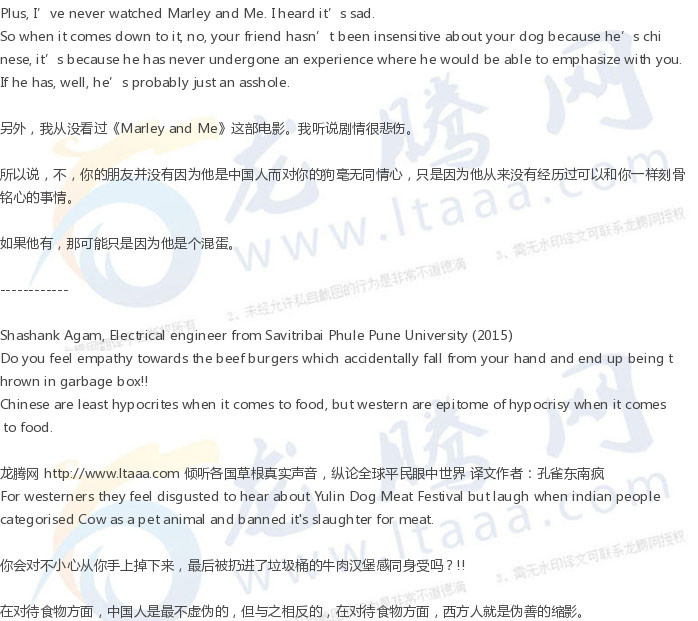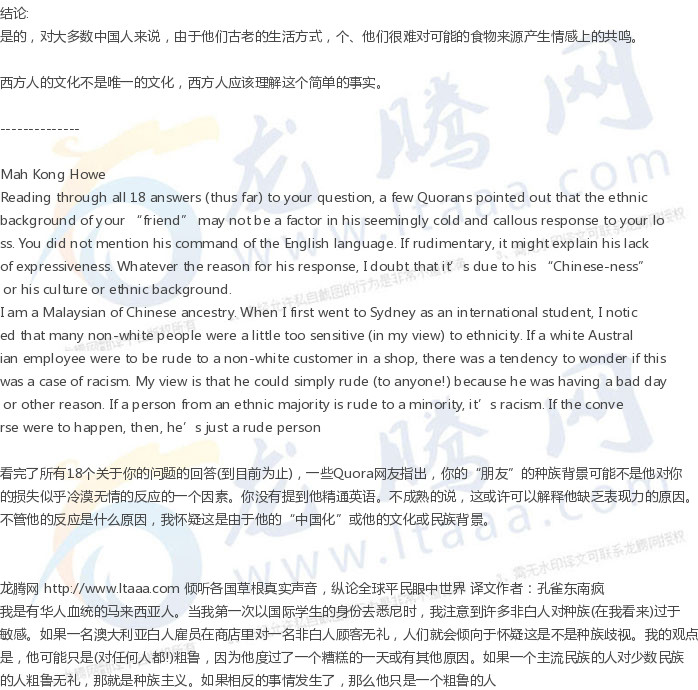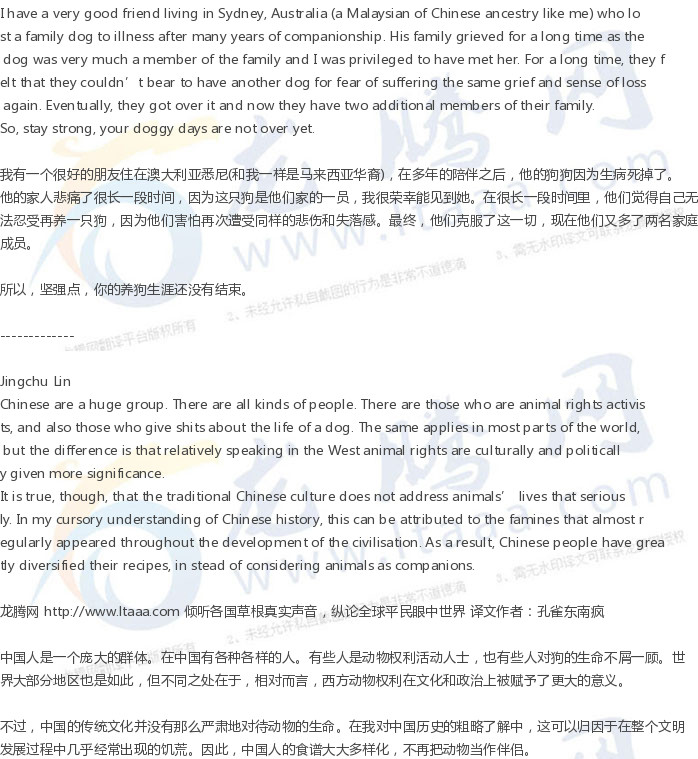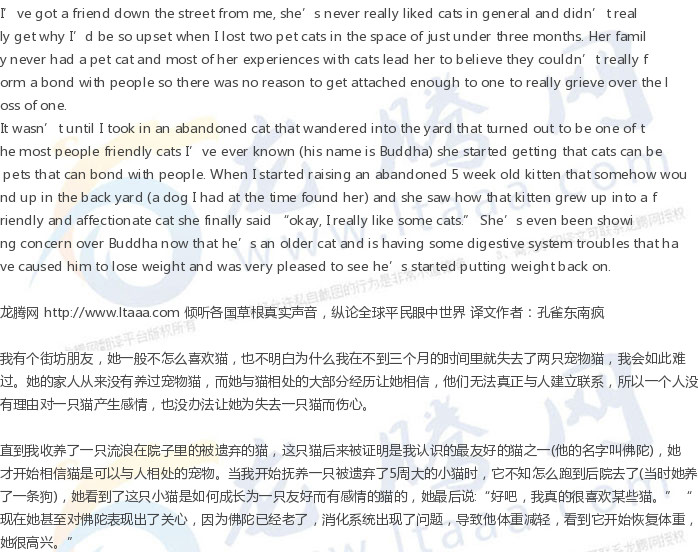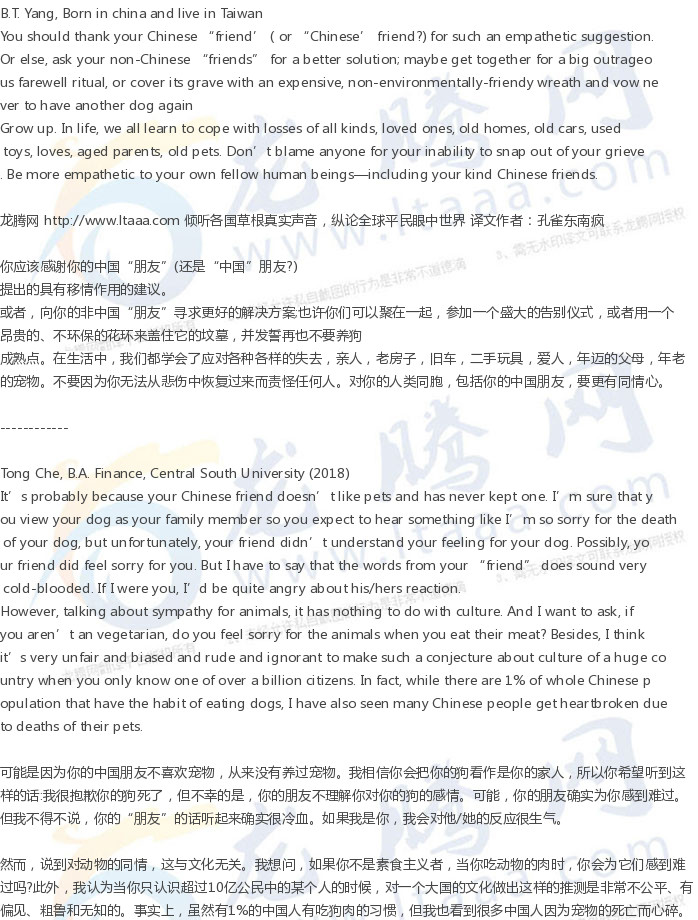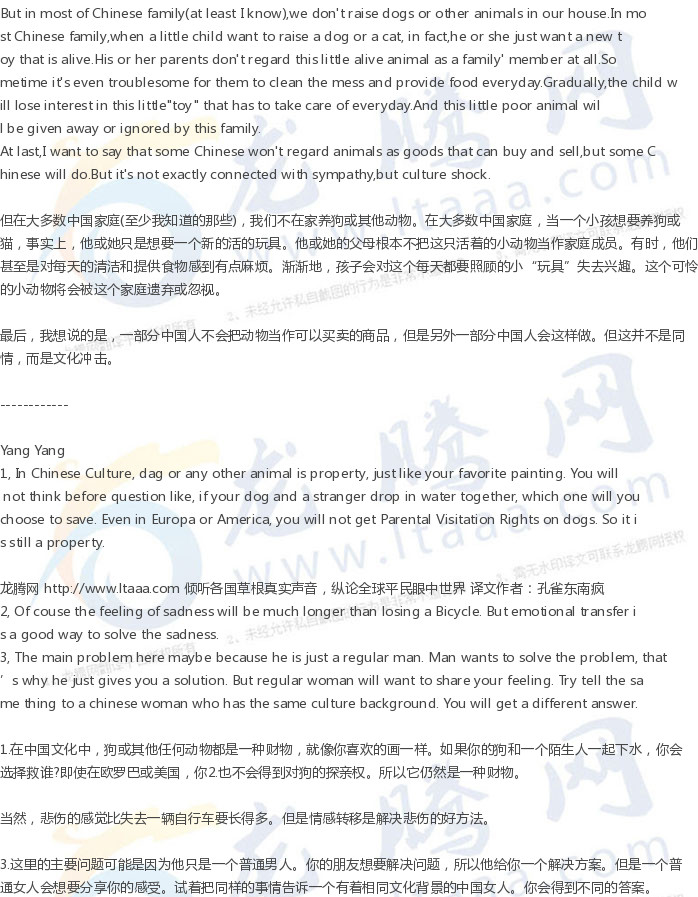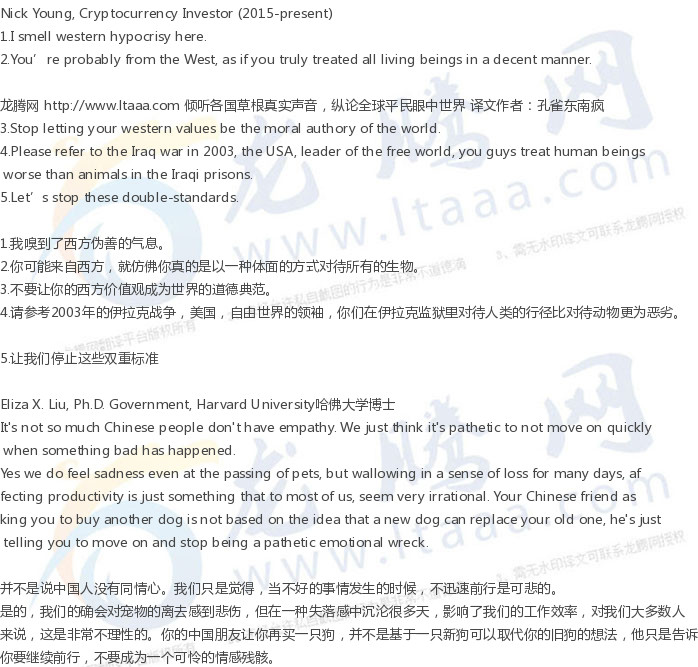当我的中国“朋友”发现我的狗狗最近死了,为什么他说“再买一只就是了”?在中国文... [美国媒体]
quora网友:我已经在中国生活了近10年,已经习惯了在这里生活,以及周围的普通中国人,我犹豫了几秒钟,想知道为什么你会问这个问题,花了一分钟在脑子中整理了一下逻辑,思考了一下为什么这种回答会被认为是消极的回复......
Why did my Chinese “friend” say “just buy another one” when he found out my dog had recently died? Is it uncommon to feel empathy for animals in Chinese culture?
当我的中国“朋友”发现我的狗狗最近死了,为什么他说“再买一只就是了”?在中国文化中,对动物的同理心很少见吗?
Tom McGregor, I lived in Beijing since Oct. 2010
I have lived in China for almost 10 years and have gotten so accustomed to residing here and being around regular Chinese people that it took me a few seconds to wonder even why this question was asked and another minute to engage in logical thinking to see how such a comment can be viewed as negative.
At first glance, I saw nothing wrong with the phrase “just buy another one.” A few years ago, my wife, Zhou Yawei, a Chinese native, had visited my parents in Texas with our young son, Peter. My mother really loved her pet dog and held numerous conversations with us about it. At one point, my mother mentioned that she worried that if this dog dies later, she would feel heartbroken about that.
It was either my wife or I, who said, “so, you can get another dog,” but my mother said she had a lifetime of family pets and vowed this would be her last dog for the rest of her life. So we spent the next hour discussing whether this is a good or bad idea, analyzing all angles, weighing the outcomes, as well as the pros and cons about this decision.
我已经在中国生活了近10年,已经习惯了在这里生活,以及周围的普通中国人,我犹豫了几秒钟,想知道为什么你会问这个问题,花了一分钟在脑子中整理了一下逻辑,思考了一下为什么这种回答会被认为是消极的回复。
It’s no big deal if you can’t survive here. I myself had lived in South Korea for sevenyears, which is like boot camp for ‘Culture Shock’ expats, and returned to my native country for three years after that. I started my life in China in 2010. Any time, I face difficulties, I just remind myself, “If I could survive South Korea, I can do alright in China.”
I believe that had I never undergone the rigorous mental toughness training in South Korea, I would likely have failed in China too, worrying over every little problem that occurs each and every day of my life. There’s truth to the age-old adage, “What doesn’t kill you only makes you stronger.”
So you may not like the truth I’m telling the person who lost his pet dog. But, people and pets die, which is just a fact of life. Criticizing the Chinese because you believe they lack empathy is not the right solution for you to overcome your apparent grief. When we become adults, we are expected to act like adults. You can either go get another dog or just move on with your life.
Be strong and you will win the game of life.
如果你不能在这里生存,那没什么大不了的。我本身曾经在韩国生活了7年,这就像外派人员的“文化冲击”训练营,之后又回到了我的祖国呆了3年。我2010年开始在中国生活。每当我遇到困难的时候,我就会提醒自己:“如果我能在韩国生存下去,我在中国也能做得很好。”
我相信,如果我没有在韩国接受过严格的心理韧性训练,我可能也会在中国失败,担心我生活中每天发生的每一个小问题。俗话说得好:“杀不死你的,只会让你更强大。”
所以你可能不喜欢我告诉那个失去宠物狗的人的真相。但是,人和宠物都会死去,生命本就如此。因为你认为中国人缺乏同理心就去批评他们,这不是你克服你心中悲伤的正确方法。当我们成为成年人的时候,我们就应该表现得像个成年人一样。你要么再养一只狗,要么继续你的生活。
坚强点,这样你就才会成为生命的赢家。
--------------
Robert Ferrer, Some of my favorite housemates have been dogs
I’m inclined to say that your friend’s comment has less to do with him being Chinese and more to do with—and I’m just guessing here—your friend never having a pet.
Once, a friend from college had mentioned that his dog had died. I met his yappy Boston terrier once or twice, so it didn’t really mean much to me when I offered my superficial condolences.
But then years later, I got a dog myself. For 13 years Ripley was my daily companion. She was with me through good and bad times. Then one day we found a tumor in her mouth, and a month later I had to say good-bye to her.
我倒觉得,你朋友的评论与他是不是中国人的关系不大,我猜这更多的是和你的朋友从来没有养过宠物有关。
有一次,我的一个大学朋友提到他的狗死了。我曾见过他那只爱叫的波士顿梗犬一两次,所以当我表达我礼节性的哀悼时,它对我来说并没有什么意义。
但几年之后,我自己养了一只狗。13年来,雷普利一直是我每天的伙伴。她陪我度过了所有的好时光和糟糕的日子。后来有一天我们在她嘴里发现了一个肿瘤,一个月后我不得不和她说再见。
Ripley, never happier than when her feet were muddy
Friends and family knew we were close, so they offered their comfort, of course, to which I was appreciative—but when I told a colleague in passing, he dropped what he was doing, looked at me and said, “I’m so sorry to hear that, Bob. I lost my dog a few years ago and it still hurts to think about it.”
The look on his face told me everything. He was back in that room when he had to put his dog to sleep, just as I am now as I write this, holding Ripley in her last moments.
For a person who has never had a pet, this sort of connection with an animal can be difficult to understand.
I’m sorry your dog died. I remember how I felt when mine died. Cut your friend some slack. You just happened to join a very unfortunate, exclusive club.
雷普利,从来没有比她的脚沾满泥巴的时候更让人感到快乐
朋友和家人都知道我们很亲密,所以他们当然会给我安慰,我对此很感激——但当我顺便告诉一位同事这件事的时候,他放下手头的工作,看着我说:“鲍勃,我很抱歉听到这个消息。”几年前我失去了我的狗,现在想起来仍然很痛苦。
他脸上的表情告诉了我一切。当他不得不让他的狗永远的睡去的时候,他又回到了那个房间,就像我写这篇文章的时候一样,在雷普利临终的时候抱着她。
对于一个从未养过宠物的人来说,这种与动物的联系很难理解。
我很遗憾你的狗死了。我还记得我的狗狗死后时的感受。放你朋友一马。你只是碰巧进入了一个非常不幸的,排外的群体。
---------------
---------------
S. L. Qian
Okay, I’ll put this somewhat simply:
Go to china and you’ll find that a surprising number of people do own dogs as pets, even if most live in apartments. They’re ideal pets, and in fact, Chinese people do indeed feel emotion. (Woah! Mind blown)
They do care about their pets, and it’s not uncommon to feel empathy for animals in Chinese culture, what on earth. The population of China is the biggest in the world, and there’s bound to be different types of people, with different values.
I think as for your friend, he’s either a complete asshole, or just doesn’t understand the pain of losing a pet, probably because he’s never had one. You can take me for an example here - I’ve only ever owned fish. I have not experienced the death of an animal of whom I was closely attached to, and therefore if someone came up to me and told me that their dog died, whilst I wouldn’t go all juST buY AnoTheR oNe I wouldn’t really be able to empahsize with them all that much. Sure, I’d feel sad for them, but I don’t think I’d really get it.
好的,我会简单地解释一下:
在中国,你会发现很多人把狗当宠物养,即使大多数住在公寓里的人。它们是理想的宠物,事实上,中国人确实有感情。(哇!难以置信吧)
他们确实很关心他们的宠物,实际上,在中国文化中,对动物的同情并不少见。中国是世界上人口最多的国家,肯定会有不同类型的人,有不同的价值观。
我想对于你的朋友来说,他要么是个十足的混蛋,要么就是不明白失去宠物的痛苦,可能是因为他从来没有养过宠物。你可以拿我举个例子——我只养过鱼。我没有体验过一个于我而言很亲密的动物的死亡,因此如果有人来找我,告诉我他们的狗死了,虽然我不会告诉他们去再买一只,我不会跟他们说那么多。当然,我会为他们感到难过,但我想我不会真正明白那种感受。
对于西方人来说,他们听到玉林狗肉节的消息感到厌恶,但当印度人把牛列为宠物动物并禁止宰杀食用时,他们却笑了。
But the downside of chinese indiscriminate food habits lead to destruction of Flora and Found in China and when the native species went extinct they started importing animal products from other parts of world which is the sole reason of hunting of animals for money. Chinese demand has already caused extinction of many species outside of China such as white Rhinos.
For example did you know that there were tigers in China also even the Panda were hunted till they were so close to extinction, Same goes for rest of all animals, most went extinct and only some are left.
Conclusion:
Yes for most of Chinese because of their ancient way of living it's fairly difficult to feel empathy for a probable food source.
Westerners culture is not the only culture and people from west should comprehend this simple fact.
但中国不加区别的饮食习惯的负面影响导致了在中国发现的植物种群的破坏,当本土物种灭绝时,他们开始从世界其他地方进口动物产品,是猎杀动物赚钱导致的这一状况。中国的需求已经导致了中国以外的许多物种的灭绝,例如白犀牛。
举个例子,你知道吗,在中国,连老虎,甚至熊猫也会被猎杀,直到它们濒临灭绝,其他所有的动物也一样,大多数灭绝了,只剩下一些得以幸存。
Don’t read too much into it. I don’t know why you made the association of your friend’s remarks to his ethnic background. Don’t stereotype. If you are a white American (Caucasian) and a white friend of yours were to make a similar statement, would you have attributed it to his race? If he turned out to be of German, Irish, Scottish, etc., ancestry, would your question be phrased as “my ‘_fill in ethnic group here_’ friend say…..? I very much doubt it.
I’m sorry for your loss and I understand that you feel bad. (Hey! A Chinese Quoran “friend” just said….
When your pain has lessened, hold on to the beautiful memories of your dog and, one day - when you are ready (and you WILL know when you are ready), you will get yourself another doggy companion and create new beautiful memories.
不要对做太多解读。我不知道你为什么把你朋友的话和他的种族背景联系起来。不要有成见。如果你是一个美国白人(白种人),而你的一个白人朋友也发表了类似的声明,你会把这归因于他的种族吗?如果他的祖先是德国人、爱尔兰人、苏格兰人等等,我很怀疑你的问题就会变成为“我的朋友说……”。
我为你失去的感到难过,我也理解你的难过。(嘿!)一个中国Quoran“朋友”说....
当你的痛苦减轻了,珍藏好你与狗狗的美好回忆,当有一天——当你准备好了(你也知道你准备好了),你会找到另一个狗狗伴侣,创造新的美好回忆。
Plus, the majority of Chinese people have not had the experience of Christianity, which deems life as divine, though Buddhism, which is less influential, does tell people not to kill animals.
Above all, it is important not to generalise. There are certainly people who feel the opposite to your friend, and as the society develops, there can be more people who feel in your way.
此外,大多数中国人没有基督教的经验,基督教认为生命是神圣的,尽管佛教的影响较小,但告诉人们不要杀动物。
最重要的是,不要一概而论。当然,有些人与你的朋友意见相左,随着社会的发展,会有更多的人与你有同样的感受。
-------------
Betsy Johnson, disabled connoisseur of geek culture
Some people, regardless of race or country they live in, are assholes about animals. For some people some or all animals will just be things to them.
My aunt is a totally privileged white American and her reaction to finding out my sweet little pet silkie hen that I hand raised had died was to bring on chicken dinner jokes. It wasn’t because she was white or American, it was just because she was utterly insensitive since she saw that bird as a thing instead of a pet I cared about and put a lot of time in to raise and keep. It was an abstract thing to her, nothing more. Perhaps if she had interacted with that hen she wouldn’t have been so blase about it, but since she never did it was “just a bird” to her. It probably didn’t help any that her own experiences with chickens were all involving farm birds raised for meat and eggs, not ones kept as pets.
有些人,不管他们生活在哪个种族或国家,对待动物都像个混蛋一样。对一些人来说,某些或所有的动物对他们而言只是普通的事物。
我的阿姨是一个完全享有特权的白人美国人,当她发现我亲手饲养的可爱的小宠物西尔基母鸡已经死了,她的反应是讲了个鸡肉晚餐的笑话。不是因为她是白人或美国人,而是因为她完全的麻木不仁,因为她把那只禽类看作是一件东西,而不是我关心并花了很多时间饲养的一只宠物。这对她来说是一件抽象的事情,仅此而已。也许如果她和那只母鸡有过接触,她就不会对此如此无动于衷了,但因为她从来没有这样做过,所以对她来说那 “只是一只禽类”。她自己养鸡的经验可能对她没有任何帮助,因为她自己养鸡的经验都涉及到农场饲养的家禽,饲养这些家禽是为了吃肉和蛋,而不是作为宠物饲养的。
So maybe don’t focus on them being Chinese as the cause. Maybe they’ve never had a pet dog, maybe they were raised to think of pets as things rather than family members. Maybe your dog is just an abstract to them they can’t really connect any emotion to, but if they really had a chance to know wouldn’t be so apathetic about the dog’s passing. Maybe they’re just not animal people period. Some people just never get the concept of forming that kind of emotional connection with an animal, or at least don’t until the right animal that can make them understand it comes into their life. Just assuming their ethnicity may be the reason is a bit much
所以也许不要把他的中国人身份作为原因。或许他们从来没有养过宠物狗,也许他们从小就认为宠物是动物而不是家人。也许你的狗对他们来说只是一个抽象的概念,他们无法将其与任何情感联系在一起,但如果他们有机会了解的话,就不会对狗的离去如此无动于衷了。也许他们只是不喜欢动物。有些人永远不会有与动物建立情感联系的想法,或者至少在合适的动物出现在他们的生活中时才会有这样的想法。随便猜测他们的种族身份可能是他们无情的原因,这就有点过了。
------------
-------------
Frank Y.D. Chan, lives in China (1998-present)
I think the first reason is that maybe your friends did not mean to hurt you by mentioning the thing. In Chinese culture, saying something is dead is impolite, so people just do not tend to mention the word “dead” or “die”, no matter how he/she feels empathy. In day-to-day language, people will avoid talking about death. When a person is dead, we say that the person has gone.
I disagree with the point that the Chinese culture does not respect life. Buddhism, as a major part of Chinese folk beliefs, cherishes life very much. Killing a life is always regarded as a deep sin in Chinese beliefs. Besides, huge number of Chinese families have dogs as their pets, who will understand your sadness.
I guess your friend just tried to make you not too sad about your dog’s death. Personally, I think he did not do it properly, as I would be a bit angry if he/she had said the same words to me. But it is also possible that your friend is just a jerk. You have to judge on your own. Please don’t blame Chinese or Chinese culture.
我认为首要的一个原因是,也许你的朋友并不是故意提起这件事来伤害你。在中国文化中,说“死”是不礼貌的,所以不管对方有多同情,人们都不会提到“死”或“死亡”。在日常用语中,人们会避免谈论死亡。当一个人死了,我们说这个人走了。
我不同意中国文化不尊重生命的观点。佛教作为中国民间信仰的重要组成部分,非常珍惜生命。在中国人的信仰中,杀人是一种深深的罪过。此外,很多中国家庭把狗当作宠物,那些人都会理解你的悲伤。
我猜你的朋友只是想让你对你的狗的死不那么伤心。就我个人而言,我认为他做得不好,如果他/她对我说了同样的话,我会有点生气。但也有可能你的朋友只是个混蛋。你必须自己进行判断。请不要责怪中国或中国文化。
------------
Carol Wang
In last winter vacation,I raised a cute rabbit.I spent wonderful time with it.But I had to ask my sister to help me take care of it when it was time to return to school.I was very sad for a long time,I feel like I lost a very important friend.
I guess your friend maybe don't like animals or he haven't raised animals at all.In his opinion, he didn't regard animals as one of human beings' friends.
Actually,it's kind of culture shock.When I watch American movies or talk with my foreign friend,it's commen for American to raise dogs in the house.They have regarded the dogs as one of their members in the family.I watched a movie called Ramona and Beezus years ago.In this movie,everyone in the family was crying when their lovely dog died,which was impressed me a lot.
在去年寒假,我养了一只可爱的兔子。我和它一起度过了美好的时光。但是当我要回学校的时候,我不得不让我的妹妹帮我照顾它。我伤心了很长一段时间,我觉得我失去了一个非常重要的朋友。
我猜你的朋友可能不喜欢动物,或者他根本没有养过动物。在他看来,他不认为动物是人类的朋友之一。
实际上,这是一种文化冲击。当我看美国电影或和外国朋友聊天时,美国人在家里养狗是很正常的。他们把狗看作是家里的成员之一。几年前我看了一部叫《雷蒙那与比祖斯》的电影。在这部电影中,当他们可爱的狗死了的时候,家里的每个人都在哭,这给我留下了深刻的印象。
-------------
Yang HuahaoActually Chinese become more and more love animal nowadays. Many Chinese treat a dog or cat as their family member.
I think perhaps your Chinese friend want to encourage you to have a new pet. But he unaware your sadness about you lose your dog.Maybe he is kindness but use a wrong word.
Do Chinese eat dog?yes Chinese eat dog in some areas.But most of Chinese against it. China have over 13 hundred million people. Only extremely very very little people eat dog meat.
事实上,现在中国人越来越喜欢动物了。许多中国人把狗或猫当作家庭成员。
我想也许你的中国朋友想鼓励你养一只新宠物。但是他没有意识到你因为失去了你的狗狗而产生的悲伤。也许他是个好人,但用词不当。
中国人吃狗肉吗?是的,在一些地区中国人吃狗肉。但大多数中国人都不吃。中国有超过13亿人口。只有非常非常非常少的人吃狗肉。
----------------
Dana Beehr
I don’t think that’s a Chinese thing. I think there are many people all over the world who would have the same reaction — usually people who aren’t dog lovers!
For example, my in-laws are wonderful people, but they are not animal lovers. I could easily see them saying that if our dog died, simply because they didn’t understand what it was like to own and love a dog.
And to be fair, this was the famous veterinarian James Herriot’s standard advice to anyone who lost a pet. His thinking was that getting another dog wouldn’t replace the old dog, but it would give you something new to love.
我不认为这是一件中国特色的事情。我想世界上有很多人会有同样的反应——通常都是些不爱狗的人!
例如,我的姻亲,他们都是些很好的人,但他们不是动物爱好者。我很容易看到他们说,他们很容易就会对我说那些话,仅仅是因为他们不明白拥有和爱一只狗是什么感觉。
说句公道话,这是着名兽医詹姆斯·赫里奥特给任何失去宠物的人的标准建议。他认为,再养一只狗并不能取代原来那只狗,但它会给你新的爱。
-------------
------------
Leta Rosetree, former Therapist (1985-2000)
Ask your friend how dogs are treated/regarded where he’s from. Are dogs part of the [Chinese] family, or are they an easily replaceable possession? When people from different cultures meet, assumptions are easily made. Communication becomes more important every day. Possibly Your friend might have thought he was being comforting. Or your friend doesn’t feel the same way about animals as you do. Or he thinks everyone regards pets as nothing significant in terms of unique companions, and they’re easily interchangeable and replaceable. One way to find out why he commented as he did, would be to ask if he’e ever had a dog, and how was that relationship for him, was it special or was it an easily replaceable one.
问问你的朋友他家乡的狗是怎么被对待的。狗是(中国)家庭的一部分吗?还是很容易被替代?当来自不同文化背景的人相遇时,他们很容易做出假设。交流变得越来越重要。也许你的朋友认为他在安慰你。或者你的朋友对动物的感觉和你不一样。或者他觉得每个人都认为宠物并不是独一无二的伴侣,它们很容易互换和替代。要想知道他为什么这么说,一种方法是问他是否曾经养过狗,这段关系对他来说是怎样的,是特殊的还是很容易被取代的。
--------------
Elpie Kay, Git of nothing
I think your acquaintance just tried to comfort you. The dog is gone and nobody can bring it back. Keeping another dog could help you get over sorrow and move on. If the acquaintance doesn't feel empathy for animals, he/she could have just said nothing to you.
Before you judge the acquaintaince and the culture, have you talked with him/her about your feelings and thoughts? I guess not. If yes, you wouldn't have asked the first question. Why not if you really want to know the answer? You could ask him/her which is more important to him/her, you or a dog.
For the second question, it's common. Chinese people are humans too. Some people love dogs, some fear dogs, some hate dogs, and some are just neutral.
我想你的熟人只是想安慰你。那只狗走了,没人能把它重新带回来。养另一只狗可以帮助你克服悲伤,继续前行。如果你的熟人对动物不感兴趣,他/她可能只是随口说说。
在你判断你的熟人及其文化之前,你和他/她谈过你的感受和想法吗?我猜并没有。如果有的话,你就不会问第一个问题了。如果你真的想知道答案,为什么不问问他呢呢?你可以问他/她哪个对他/她更重要,你还是一条狗。
对于第二个问题,这很常见。中国人也是人。有些人喜欢狗,有些人害怕狗,有些人讨厌狗,有些人只是中立。
FJ Shi
No. More likely he has never had a pet before.
Same if you see a little one next to you crying loud on descending airplane. There are people deep in heart shouting “shut it UP!”. There are also people trying their best making monkey face or offer sweets. Guess who is more likely have kids by themselves?
不。更有可能的是,他以前从未养过宠物。
同样的,如果你看到你旁边的一个小家伙在飞机上大哭。有人在内心深处大喊:“闭嘴!”也有一些人试着做猴子脸或者提供糖果。猜猜谁更可能是有孩子的那个人?
Paul Wong, Valuation Executive at PMC Failities & Real Estate Sdn Bhd (2017-present)
Rather than say Chinese, I think your friend has never actually had a pet that he or she loved. Or he doesn’t have any social skills.
As far as I know, there isn’t anything in Chinese Culture that teaches people to not feel empathy towards animals.
我认为与其质疑所有中国人,倒不如说是你的朋友从来没有养过自己喜欢的宠物。或者他没有社交技能。
据我所知,在中国文化中,没有任何东西教人们不要对动物有同情心。
Jamie Cawley, LIved in China 2012-2018, now Hong Kong
2012-2018年住在中国,现在在香港
No they’re just like the rest of us.
不,他们和我们一样。
版权声明
我们致力于传递世界各地老百姓最真实、最直接、最详尽的对中国的看法
【版权与免责声明】如发现内容存在版权问题,烦请提供相关信息发邮件,
我们将及时沟通与处理。本站内容除非来源注明五毛网,否则均为网友转载,涉及言论、版权与本站无关。
本文仅代表作者观点,不代表本站立场。
本文来自网络,如有侵权及时联系本网站。
图文文章RECOMMEND
热门文章HOT NEWS
-
1
Why do most people who have a positive view of China have been to ...
- 2
- 3
- 4
- 5
- 6
- 7
- 8
- 9
- 10
推荐文章HOT NEWS
-
1
Why do most people who have a positive view of China have been to ...
- 2
- 3
- 4
- 5
- 6
- 7
- 8
- 9
- 10


